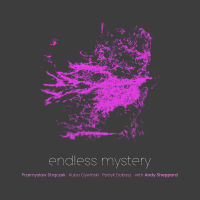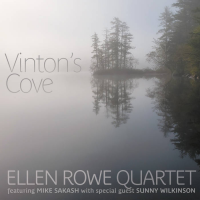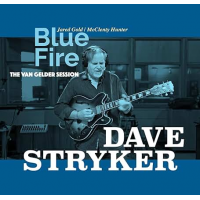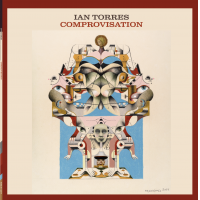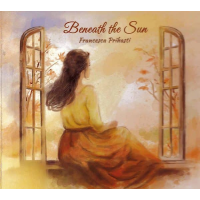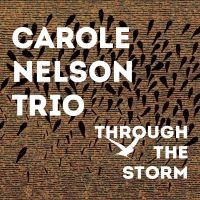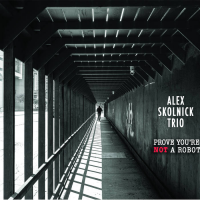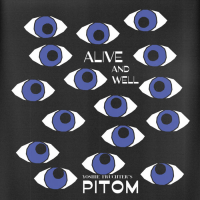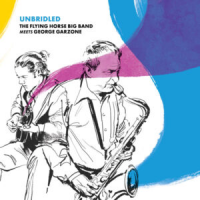Home » Jazz Articles » Multiple Reviews » The Allman Brothers Band: Gems From The Vaults
The Allman Brothers Band: Gems From The Vaults
 The five-man lineup of The Allman Brothers Band that remained in the wake of founder member/guitarist Duane Allman's death is the missing link in the history of the band. In part, that's because their studio recordings were initially overshadowed on Eat a Peach —despite the fact two of its three initial cuts are currently staples of the band's repertoire—but also because they played so comparatively few live concerts. The recently-released two-disc set of archival recordings(available on the ABB website and at shows this summer) verges on the spectacular at some points because the band was playing with a passion and invention grounded in the grieving of Skydog's death. In addition, an SACD release of Eat A Peach , released virtually simultaneously, presents what is arguably the best sounding version of the classic album and reaffirms the realignment of the quintet as documented so forcefully on the concert set.
The five-man lineup of The Allman Brothers Band that remained in the wake of founder member/guitarist Duane Allman's death is the missing link in the history of the band. In part, that's because their studio recordings were initially overshadowed on Eat a Peach —despite the fact two of its three initial cuts are currently staples of the band's repertoire—but also because they played so comparatively few live concerts. The recently-released two-disc set of archival recordings(available on the ABB website and at shows this summer) verges on the spectacular at some points because the band was playing with a passion and invention grounded in the grieving of Skydog's death. In addition, an SACD release of Eat A Peach , released virtually simultaneously, presents what is arguably the best sounding version of the classic album and reaffirms the realignment of the quintet as documented so forcefully on the concert set.Macon City Auditorium 2-11-72 , a double disc package taken from a two-set performance in their hometown, illustrates how the band was repositioning itself in various ways to compensate for the loss of their late leader. Gregg Allman still spends the majority of his time behind the Hammond B3 organ, but the multiple appearances of him playing a Wurlitzer piano, notably on "Done Somebody Wrong" and "One Way Out, " gives the band a more compact, crisp sound. The Allman sibling's singing remains a foundation of soulful expression for the group, however, whether it's on "Trouble No More," well on its way to becoming the concert staple it is today, or "Stormy Monday," which he sings as a collective expression of sorrow for his missing brother.
Dickey Betts has long been praised for he way he stepped up into the spotlight as the sole guitarist in ABB, but Macon 2-11 reveals that, while there is no doubt he retained all the fire of his dual duties with Duane, his interplay with bassist Berry Oakley on such tunes as "Hot 'Lanta" went a long way in maintaining a team means of generating the ferocity for which the band had become famous. Jousting, following and harmonizing with Betts at various points during a marathon "Whipping Post," (and doing a mean randy vocal on Muddy Waters' "Hoochie Coochie Man"), Oakley helps retain so much of the grandeur and power The Allman Brothers had come to symbolize: you could listen to various points of this performance, or Dickey's new instrumental "Les Brers in a Minor," and think you were hearing outtakes from the Fillmore period.
Shifting to a hearing of the hybrid Eat A Peach disc drives those same points home. SACD's perform the great service of opening up and expanding the recorded sound of a given session and this 1972 album benefits tremendously from this type of mastering. The three tracks the five-man ABB recorded after Duane Allman's death become almost three-dimensional as the shifting textures of keyboards, overdubbed guitars and the increasing prominence of Oakley's bass intertwine on "Les Brers." The same goes for tune "Ain't Wastin' Time No More," where Betts' languid slide plays off against Allman's piano figure, while the bottom end of the dynamic range, never deep enough on previous cd editions, even on recent digital reissues, balances the airy melody line. "Melissa" is bound to be rediscovered as one of Gregg's finest tunes with the mix of acoustic guitar and plaintive lead guitar skirting sentimentality and, at this point in 2004, turning the tune into as much of a reflective piece---it's being performed regularly on the 2004 ABB summer tour—as a homage to Duane.
The resounding thump and kick at the low end of the dynamic spectrum becomes even more palpable in the live cuts from Fillmore performances. Jaimoe and Butch Trucks become as important to the overall sound of the band as Skydog's slide or Gregg's growl and all three elements cut through at their respective levels on "One Way Out' and "Trouble No More." Of course, the spectacular panorama of "Mountain Jam" would stand to benefit the most from the digital reworking and it does, becoming once again an example of how indispensable was the far-reaching bass playing of Berry Oakley: the transition from his solo seems to now set the tone for the majestic conclusion.
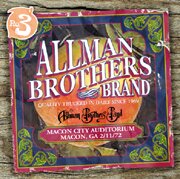 On Macon , however, it's definitely Dickey who leads his four brothers in conjuring up what's arguably an equal intensity: the slashing, succinct leads he plays at various points during an extended "You Don't Love Me," is blistering stuff, far from the sweeter, lighter country-tinged tone he fashioned later on in the Brothers evolution. And that doesn't even speak to the pointed homage to pure blues with which he ends the nineteen-minute plus track, where drummers Butch Trucks and Jaimoe also step forward figuratively if not literally alongside the guitarist to fill the void left by their departed comrade.
On Macon , however, it's definitely Dickey who leads his four brothers in conjuring up what's arguably an equal intensity: the slashing, succinct leads he plays at various points during an extended "You Don't Love Me," is blistering stuff, far from the sweeter, lighter country-tinged tone he fashioned later on in the Brothers evolution. And that doesn't even speak to the pointed homage to pure blues with which he ends the nineteen-minute plus track, where drummers Butch Trucks and Jaimoe also step forward figuratively if not literally alongside the guitarist to fill the void left by their departed comrade.
It's interesting to note this concert was recorded some nine months before the addition of pianist Chuck Leavell to the ABB lineup that would record the Brothers and Sisters album(containing the Brothers lone hit single "Ramblin' Man" as well as "Jessica"), during which Oakley would die(in a motorcycle accident eerily similar to Duane's) to be replaced by Jaimoe's old buddy Lamar Williams. The group would maintain its adventuresome streak in this phase, but when you listen to Macon 2-11-1972 , you marvel at what this quintet might've accomplished had they stayed together over a longer period of time. The absolute beauty of the sound on the new Eat A Peach in large measure compensates for the relative sonic deficiencies that render the depth, presence and stereo separation of the archive title less than it could be: as with the classic title, the commitment of these musicians to themselves and their improvisational blues-rock is an absolute marvel to behold.
Tags
About Allman Brothers Band
Instrument: Band / ensemble / orchestra
PREVIOUS / NEXT
Support All About Jazz
 All About Jazz has been a pillar of jazz since 1995, championing it as an art form and, more importantly, supporting the musicians who make it. Our enduring commitment has made "AAJ" one of the most culturally important websites of its kind, read by hundreds of thousands of fans, musicians and industry figures every month.
All About Jazz has been a pillar of jazz since 1995, championing it as an art form and, more importantly, supporting the musicians who make it. Our enduring commitment has made "AAJ" one of the most culturally important websites of its kind, read by hundreds of thousands of fans, musicians and industry figures every month.






